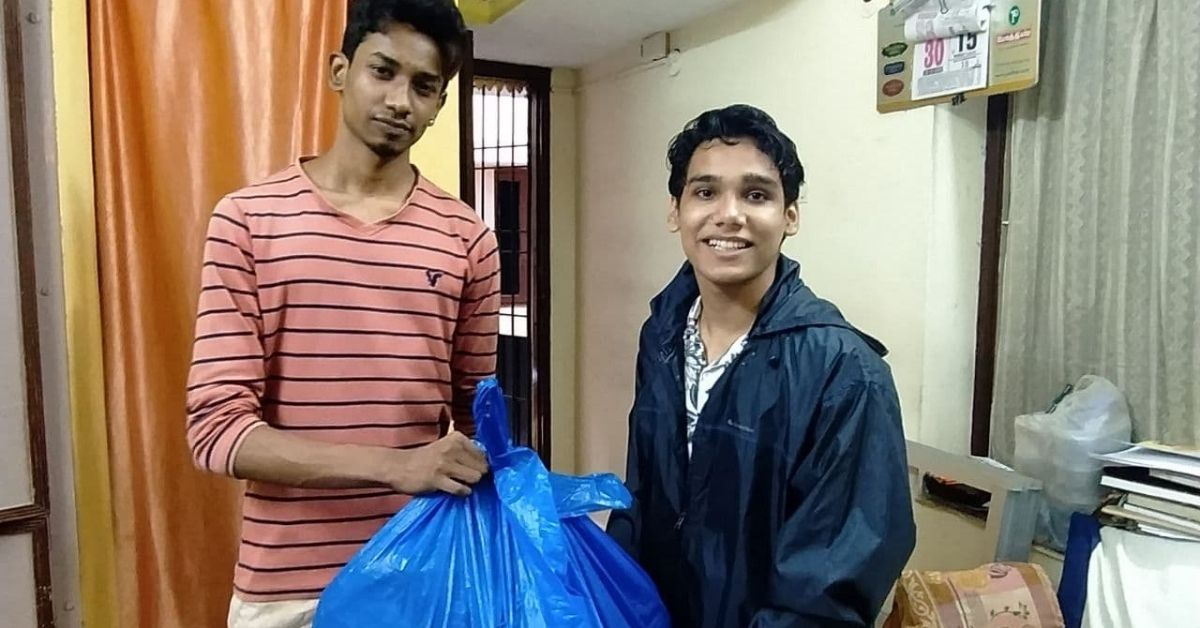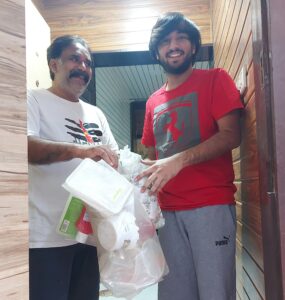Students Collect Over 30 KG Waste Plastic Bottles To Make DIY Hydroponics Planters
Ten students of ENACTUS-UBS in Mumbai are upcycling plastic bottles to create hydroponic planters that also help save water.

A bottle of chilled cold drink during a sultry summer day seems like a harmless idea when considered in isolation. But what if we told you that one million such bottles are purchased every minute across the world?
Why this becomes important is because every single one of them is made of plastic.
Most plastic is manufactured by turning petroleum into a material unrecognised by microorganisms, making it tough for them to break it down. This is the reason why it takes years for the material to decompose naturally. Your travel-friendly PET bottles, for instance, take 450 years to decompose, polluting the environment for their entire life span.
While this information may seem overwhelming, our driven youth is taking matters into their own hands and combating the issue — one bottle at a time.
Ten students of Universal Business School (UBS), Mumbai began Project ROOP in August 2020 to upcycle plastic bottles under the wing of ENACTUS-UBS. ‘Recycle Our Own Plastic’ or ROOP works on a cost-effective model that reuses PET bottles to create hydroponic pot planters. As opposed to recycling waste, upcycling allows the team to use the bottles as they are, without involving the cost of breaking them down to build something entirely new.
“We use four to five plastic bottles and cut them into half. The upper part of the bottle is reversed and inserted into the bottle. The upper part is stuffed with a jute cloth. This is where the plant is placed. Two holes are drilled on the lower part on opposite sides of each bottle and a pipe is passed through them. This connects all the bottles together to ensure all of them receive a water flow,” ENACTUS President, Sudharma Kambhamettu, explains.
This unique prototype not only reuses plastic but also eliminates the use of soil in farming. The head of this project is Het Gor, who says, “Upon testing the planters internally, we even found it convenient to use less water in the process. I could water the plants at an interval of two to three days and still receive a great yield.”
‘Redesign to Reuse’
ENACTUS is a non-profit social enterprise and experiential learning platform. Its aim is to help student members build business models in line with universal Sustainable Development Goals (SDGs). Using this platform as an opportunity, these students decided to build a product that is not only environmentally friendly but also helps society.
“Funding can be a cause for concern in such a case, but the creativity of the students is enough to combat the problem,” says Sudharma. To get Project ROOP running, these student entrepreneurs hosted a fundraising event called ‘Redesign to Reuse’, which saw the participation of over 50 members. The team even went on to host two cleanliness drives in Mumbai and Chennai to collect plastic waste bottles needed for the project.
Through these drives alone, they were able to collect 30 kgs of plastic waste.

The onset of the pandemic proved to be a bump in the road but they continued to power through the cause even remotely. There was no time for excuses and the project was immediately shifted to a podcast channel called ‘Make it Green’ to keep generating awareness while on-ground action was in abeyance.
Throughout this time these enthusiastic environmentalists worked consistently towards refining and finalising their prototype to ensure that it was cost effective, environment-friendly and unique.
Upon hearing about the initiative, environmentalist Ruchi Jain of Mumbai shares, “I would definitely vouch for hydroponic pots. They are pocket-friendly and a great innovation for more and more people to use them. We need more of such creations to boost not only awareness but also a green culture of living, and of course, anything that creates more fresh air in the process is great!”
Being Instruments of Change
Waste management is not where the goals of these high-spirited individuals end. Their nifty innovation tackles the problem of one-time use plastic disposal, offers a cost-effective solution to farming, and generates employment opportunities through targeted dispersal.
The students are currently working in collaboration with Light of Life Trust, which has its network base among the rural population of Maharashtra. “Through their support, we aspire to teach the skill of making upcycled hydroponic planters to underprivileged communities and help generate employment opportunities through it,” says the student president. The prototype is now ready for implementation, and together the two organisations are targeting the training of 10 rural women to begin with.
Unfettered action and a passion for taking charge wherever possible has reaped benefits for these young changemakers. Their project has not only found the whole-hearted support of their college faculty, but has also received enthusiastic response from their own peers, who have become advocates for these planters in different cities.
Despite the dynamic scale of plastic consumption, these students have begun a cycle of change and put to practice the simple principle of — “Be the change you want to see in the world.”
Edited by Yoshita Rao
If you found our stories insightful, informative, or even just enjoyable, we invite you to consider making a voluntary payment to support the work we do at The Better India. Your contribution helps us continue producing quality content that educates, inspires, and drives positive change.
Choose one of the payment options below for your contribution-
By paying for the stories you value, you directly contribute to sustaining our efforts focused on making a difference in the world. Together, let’s ensure that impactful stories continue to be told and shared, enriching lives and communities alike.
Thank you for your support. Here are some frequently asked questions you might find helpful to know why you are contributing?


This story made me
-
97
-
121
-
89
-
167











